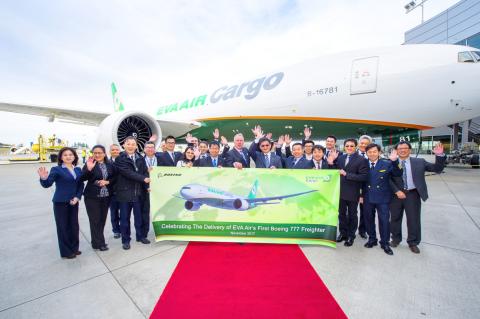EVA Airways Corp (長榮航空) on Friday reported that it saw a marked profit gain last quarter over a year ago on rising demand for passengers and cargo transport.
Net income during the period ending Sept. 30 surged 92.4 percent annually to NT$4.53 billion (NT$150.14 million), EVA said in a statement.
Earnings per share were NT$1.08 last quarter, compared with NT$0.56 the previous year. In the second quarter, the carrier made earnings of NT$0.39 per share, company data showed.

Photo: Chen Yi-chia, Taipei Times
The carrier attributed the gains to expanded flights to North American and North Asian destinations.
In the first nine months of the year, EVA saw its overall passenger load factor — a measurement of how full its planes are — rise 8.9 percent from a year earlier, thanks to the carrier’s wider offering of North Asian destinations and a weaker Japanese yen.
Rising consumer spending also led to a 5.6 percent rise in air cargo transport pricing and a 5.8 percent gain in cargo transport volume, despite a 2.7 percent dip in capacity, EVA said.
The carrier has taken delivery of a new Boeing 777 freighter — currently the biggest wide-body twin-engine aircraft in the world — that is scheduled to begin transporting cargo between North Asia and North America by the end of this month, it said.
This year, the carrier pushed for a fleet upgrade to meet rising travel and cargo transport demand while reducing fuel consumption compared with older aircraft.
The upgrade, plus a recovery in demand, helped lift its accumulated net income in the first nine months to NT$5.37 billion, 15 percent higher than the previous year, with earnings per share of NT$1.28, company data showed.
Meanwhile, EVA’s board on Friday approved the retirement of president Derek Chen (陳憲弘), the carrier said, adding that it has appointed passenger management division executive vice president Clay Sun (孫嘉明) to serve as president as of Jan. 1.
Separately, China Airlines Ltd (中華航空) on Monday reported that its net income last quarter rose markedly to NT$2.95 billion, compared with NT$513 million the previous year.
Net income in the first nine months came to NT$952 million. After a net loss of NT$2 billion for the first half of the year, the earnings put the nation’s largest carrier back in the black. Earnings per share were NT$0.17.

CHIP WAR: Tariffs on Taiwanese chips would prompt companies to move their factories, but not necessarily to the US, unleashing a ‘global cross-sector tariff war’ US President Donald Trump would “shoot himself in the foot” if he follows through on his recent pledge to impose higher tariffs on Taiwanese and other foreign semiconductors entering the US, analysts said. Trump’s plans to raise tariffs on chips manufactured in Taiwan to as high as 100 percent would backfire, macroeconomist Henry Wu (吳嘉隆) said. He would “shoot himself in the foot,” Wu said on Saturday, as such economic measures would lead Taiwanese chip suppliers to pass on additional costs to their US clients and consumers, and ultimately cause another wave of inflation. Trump has claimed that Taiwan took up to

A start-up in Mexico is trying to help get a handle on one coastal city’s plastic waste problem by converting it into gasoline, diesel and other fuels. With less than 10 percent of the world’s plastics being recycled, Petgas’ idea is that rather than letting discarded plastic become waste, it can become productive again as fuel. Petgas developed a machine in the port city of Boca del Rio that uses pyrolysis, a thermodynamic process that heats plastics in the absence of oxygen, breaking it down to produce gasoline, diesel, kerosene, paraffin and coke. Petgas chief technology officer Carlos Parraguirre Diaz said that in

Japan intends to closely monitor the impact on its currency of US President Donald Trump’s new tariffs and is worried about the international fallout from the trade imposts, Japanese Minister of Finance Katsunobu Kato said. “We need to carefully see how the exchange rate and other factors will be affected and what form US monetary policy will take in the future,” Kato said yesterday in an interview with Fuji Television. Japan is very concerned about how the tariffs might impact the global economy, he added. Kato spoke as nations and firms brace for potential repercussions after Trump unleashed the first salvo of

SUPPORT: The government said it would help firms deal with supply disruptions, after Trump signed orders imposing tariffs of 25 percent on imports from Canada and Mexico The government pledged to help companies with operations in Mexico, such as iPhone assembler Hon Hai Precision Industry Co (鴻海精密), also known as Foxconn Technology Group (富士康科技集團), shift production lines and investment if needed to deal with higher US tariffs. The Ministry of Economic Affairs yesterday announced measures to help local firms cope with the US tariff increases on Canada, Mexico, China and other potential areas. The ministry said that it would establish an investment and trade service center in the US to help Taiwanese firms assess the investment environment in different US states, plan supply chain relocation strategies and